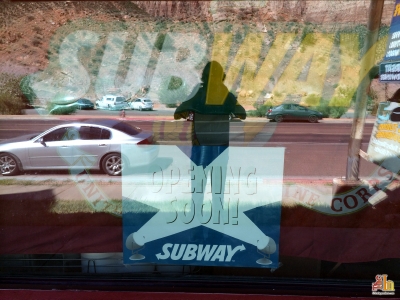Written by Brent Bonner
A four-year wait to decide the fate of a potential Subway franchise restaurant in the town of Springdale appears to have no definite end in sight.

The lawsuit seeks at least $500,000 in damages, which is what the investors report they spent preparing the location prior to the town halting the project. According to the suit, a license was granted and was up for renewal when the city’s fire chief realized the restaurant was a Subway and refused to inspect the premises.
In the lawsuit, filed with the 10th Circuit Court, the investors also claim discrimination on the part of the town based on the minority status of the investors themselves. Clay Stucki, the attorney representing the investors, stated that, “This ordinance is to screen anybody out who wants to come in and compete … They seem to pick and choose, and that is illegal.”
The lawsuit alleges that franchises are already operating in the town in the form of national gas station chains such as Chevron, and because some restaurants serve Starbucks and Seattle’s Best coffees. However, Heidi Gledhill, who manages the Pioneer Internet Café, which serves Seattle’s Best, stated that she is in no way contractually bound to purchase a certain brand of coffee and purchases it from a food supplier, similar to other businesses in town.
Meanwhile, local attorney Greg Hardman, representing the town, stated that “We dispute all allegations, including the sensationalized allegation of racial discrimination … There is no basis for any of that.” He stated that the defense of the lawsuit would be handled by the town’s insurance carrier, Utah Local Governments Trust. David Church, a Salt Lake City lawyer retained by the insurer to defend the town, said the complaint is unusual in this kind of dispute because it names so many people, from volunteers on the planning commission to town council members. “They are trying to intimidate to get leverage for a permit,” he said.
In a decision handed down on Oct. 28, 2011, District Judge Clark Waddoups found that “… because Springdale’s ordinance banning formula restaurants did not violate clearly established law, the individual defendants who enforced the ordinance are entitled to qualified immunity for their actions.”
However, four years after the process started, both groups are still waiting for a court decision as to the legality and constitutionalism of the ordinance to effectively settle the matter. On one hand, groups such as the National League of Cities support local leaders’ desires to protect the character and economic growth of their towns. On the other, organizations like the Municipal Lawyers Association state that the investors may have a solid case if they can show that the ordinance effectively limits business ownership to local investors only.
Springdale is not the only town that has passed such an ordinance. Several municipalities in California, Washington, Rhode Island, Maine, and Oregon are on a growing list of places passing ordinances prohibiting chain stores of various kinds from operation within city limits. While many of the bans have remained unchallenged, a few, with the Izzy Poco-Springdale lawsuit leading the way, are beginning to see court proceedings.
Citing pending legislation, Springdale town manager Rick Wixom declined to comment on the situation. Requests for information from the attorneys representing Izzy Poco remain unanswered at this time.




